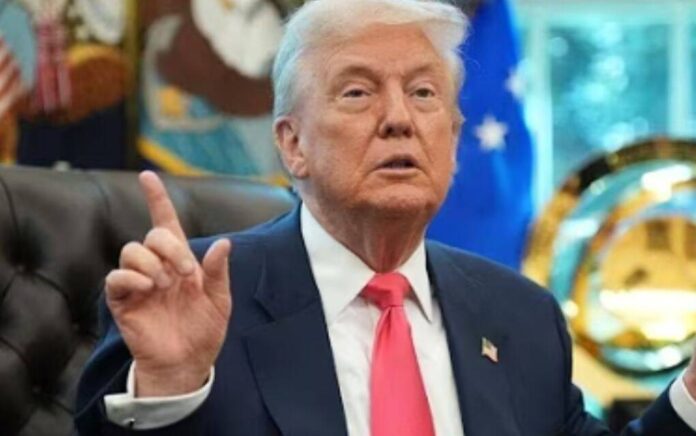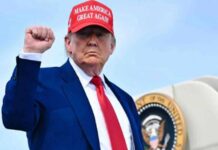
Donald Trump doesn’t care what the Fake News Media says about him. He will stay the course for his America First agenda.
But President Trump was surprised by an unexpected report that hit his Oval Office desk.
Trump’s Decisive Action on Crime Resonates with Americans
President Donald Trump’s unapologetic push to restore law and order in America’s cities is striking a chord with the heartland, as a recent AP-NORC poll reveals. With crime rates plaguing urban centers, Trump’s no-nonsense approach is earning praise from everyday Americans who are fed up with the chaos. The poll, conducted from August 21 to 25, 2025, shows that 53% of Americans approve of Trump’s handling of crime, including 46% of independents and even 16% of Democrats.
On August 11, 2025, Trump announced a bold move to deploy the National Guard to Washington, D.C., to tackle violent crime head-on. The White House reported that over 1,450 federal law enforcement officers and National Guard members patrolled D.C. on a single night, resulting in 43 arrests for crimes ranging from homicide to drug trafficking. This surge is part of Trump’s strategy to reclaim urban areas from what he describes as “violent gangs and bloodthirsty criminals.”
The AP-NORC poll highlights a clear public mandate for action. Two-thirds of Americans view crime in the U.S. as a “major” problem, with 81% recognizing it as a critical issue in large cities. Among Republicans, 96% see urban crime as a major concern, while 68% of Democrats agree. “About d*mn time that somebody did something,” said Charles Arnold, an 87-year-old Republican from San Diego, echoing the sentiment of millions who feel neglected by years of soft-on-crime policies.
Trump’s deployment of the National Guard isn’t just rhetoric—it’s a calculated response to a crisis. In Washington, D.C., approximately 800 National Guard troops have been mobilized, with some units patrolling high-traffic areas like the National Mall and Union Station. These troops, drawn from Republican-led states like Mississippi and Tennessee, provide a visible deterrent to crime while supporting local law enforcement. The administration has also surged federal agents from agencies like the FBI, DEA, and ICE to assist in operations, focusing on illegal guns, stolen vehicles, and narcotics.
Despite official data showing a 26% drop in violent crime in D.C. this year compared to 2024, Trump’s critics, like Democratic Mayor Muriel Bowser, argue there’s no emergency. Yet, the reality on the ground tells a different story. High-profile incidents, like the brutal attack on Edward Coristine, a Department of Government Efficiency staffer, in an upscale D.C. neighborhood, highlight the persistent threat of urban violence. Trump’s response—taking control of the D.C. police for 30 days under the Home Rule Act—demonstrates his willingness to act where local leaders have faltered.
The poll also reveals strong public support for military involvement in crime-fighting. A solid 55% of Americans believe it’s acceptable for the U.S. military and National Guard to aid local police in large cities. Among Republicans, 80% back this approach, while 46% of independents and 30% of Democrats agree. This bipartisan approval reflects a growing consensus that extraordinary measures are needed to restore safety in cities plagued by crime.
Trump’s strategy extends beyond D.C. In June, he deployed 2,000 National Guard troops to Los Angeles to address unrest tied to immigration enforcement raids. The White House has hinted at expanding this model to other cities like Chicago and New York, where crime rates remain a concern. While Democratic mayors like Chicago’s Brandon Johnson cry foul, claiming Trump’s actions are “unlawful,” the president’s supporters see this as a necessary stand against urban decay.
Democratic opposition has been vocal but ineffective. D.C. Attorney General Brian Schwalb announced a lawsuit on August 15, calling Trump’s takeover “unprecedented, unnecessary, and unlawful.” Yet, Schwalb’s claim of a 30-year low in violent crime ignores the fact that D.C.’s 2024 murder rate of 27.54 per 100,000 residents surpasses that of cities like Bogota and Mexico City. Trump’s supporters argue that cherry-picked statistics don’t erase the daily reality of carjackings, shootings, and drug-related crimes.
The White House’s “D.C. Safe and Beautiful Task Force” is another pillar of Trump’s plan. This initiative includes specialized units from federal agencies trained to target violent offenders. The administration has also directed the Department of Housing and Urban Development to crack down on crime in public housing and instructed the U.S. Attorney’s Office to hire more prosecutors focused on violent and property crimes. These measures aim to create a lasting impact, not just a temporary show of force.
Public sentiment is shifting in Trump’s favor. His overall job approval rating climbed to 45% in the August AP-NORC poll, up 5 points from July. His handling of the economy also saw a boost, with 43% approval compared to 38% in July.
Critics like D.C.’s Mayor Bowser and Rep. Jamie Raskin have labeled Trump’s actions as authoritarian, but their arguments fall flat against the backdrop of public support. Bowser’s claim of a “30-year violent crime low” ignores the fear residents feel in neighborhoods like Logan Circle, where a recent homicide marked the city’s 100th this year. The D.C. Council’s protests about “home rule” ring hollow when the city’s own data shows it ranks 17th among large U.S. cities for violent crime.
Trump’s vision is clear: make America’s capital a model for the nation. He’s called for a “long-term” extension of federal control over D.C.’s police, a move that would require Congressional approval but aligns with his promise to restore order. The administration’s recent executive order also tasks the National Park Service with hiring more U.S. Park Police and emphasizes clearing homeless encampments, which Trump sees as a blight on the capital’s image.
The contrast between Trump’s proactive stance and Democratic inaction is stark. While Democrats scramble to craft a counter-message, their claims that Trump’s policies are a “political liability” are undermined by the AP-NORC poll’s findings. The 53% approval for Trump’s crime policies shows that Americans, especially Republicans and independents, want leaders who prioritize safety over political correctness.
For many, Trump’s crackdown is a refreshing departure from the status quo. Residents like Christopher Her, a Maryland native who worked in D.C., praise the increased law enforcement presence, saying, “I couldn’t be more encouraged by the fact that there are people now that really want to say, ‘Stop, let’s make this better.’”



















